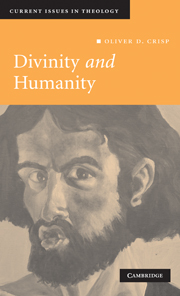2 - The human nature of Christ
Published online by Cambridge University Press: 05 June 2012
Summary
For the ‘Word made flesh’ [John 1:14] assumed another nature, not another person. For when we speak of ‘human being’, we signify only the nature that is common to all human beings.
St Anselm of CanterburyIn the previous chapter we discussed an issue that focused on the divinity and humanity of Christ as the first of three chapters laying out central aspects of a Chalcedonian Christology. Perichoresis in the Incarnation has to do with the way in which the hypostatic union of Christ's two natures are united in such an intimate fashion that the divinity of Christ because of his omnipresence penetrates the humanity of Christ, but the converse is not the case. Thus we have one person, in whom divinity and humanity are united, as the creed says, ‘without confusion or mixture’.
This chapter and the next are two parts of a larger whole. In these two chapters we shall consider a second area where issues pertaining to the humanity and divinity of Christ are important. This has to do with the human nature assumed by the second person of the Trinity in the Incarnation. Discussion of this topic has a long and convoluted history in Christian thinking, much of which has to do with what is denoted by ‘nature’ and ‘person’ in the hypostatic union. We shall focus our attention upon what Christ's human nature consists in and apply our findings to several longstanding theological problems for the Incarnation.
- Type
- Chapter
- Information
- Divinity and HumanityThe Incarnation Reconsidered, pp. 34 - 71Publisher: Cambridge University PressPrint publication year: 2007



